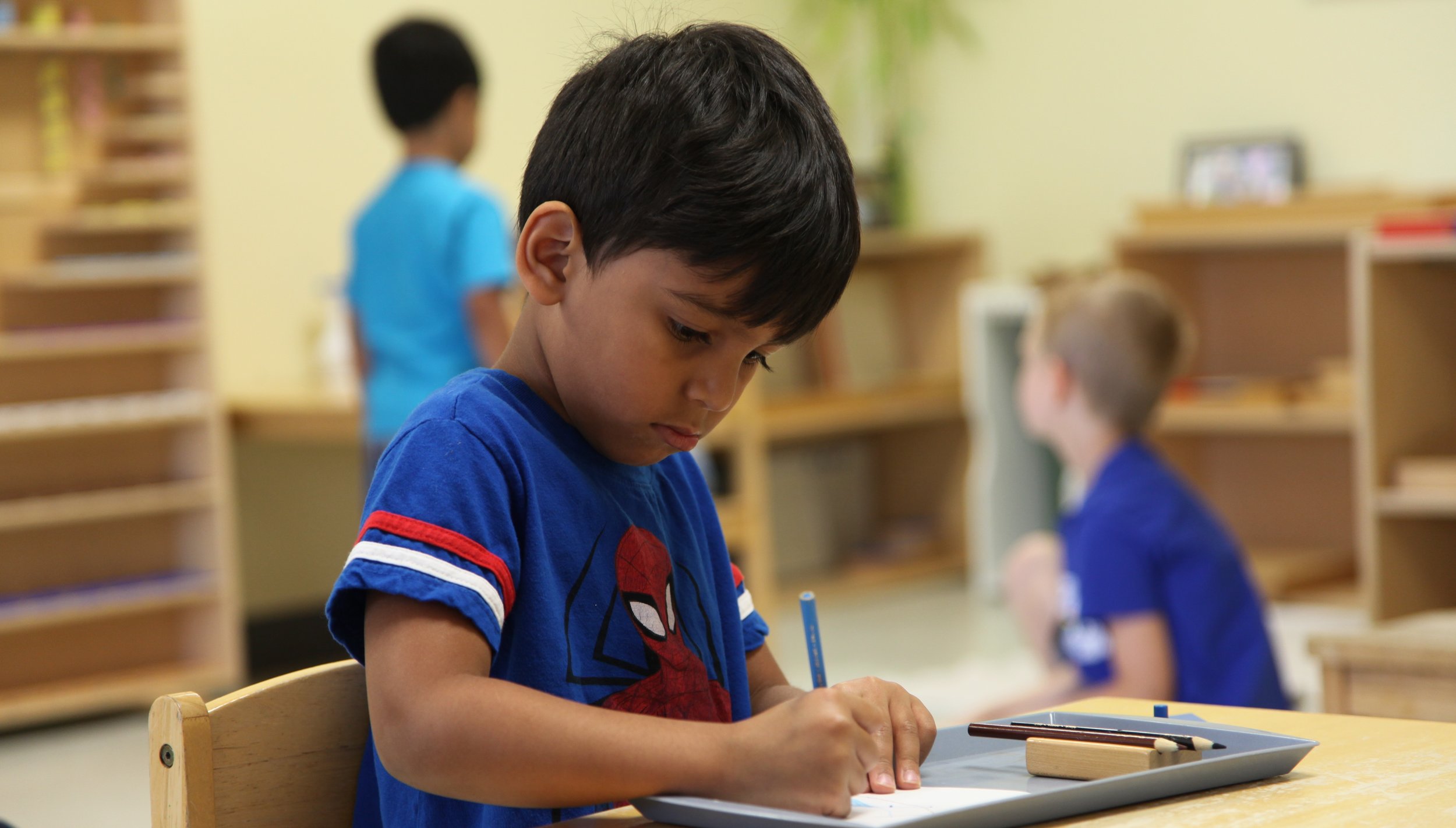
“The secret of good teaching is to regard the child’s intelligence as a fertile field in which seeds may be sown, to grow under the heat of flaming imagination. Our aim therefore is not merely to make the child understand, and still less to force him to memorize, but so to touch his imagination as to enthuse him to his inmost core. We do not want complacent pupils, but eager ones.”
Elementary | 6 - 12 years
Foundation for thinking
We want the child to learn everything!
This is how different elementary school can and should be! Traditional curriculum restricts students to what they are supposed to learn. In Montessori, we want children to be able to learn everything!
The universe and all its wonders are offered to children through the “Great Lessons”; these dramatic and scientific stories are presented annually at the beginning of the school year and give the students the ‘big picture’ of astronomy, earth science, geography, physics, biology, history, cultural and social studies, language, math, music and art. The “Great Lessons” serve to initiate students’ individual exploration and discovery and are the springboard for subsequent lessons and further research. Meaningful learning happens when children are inspired by a lesson and begin to explore the subject and work on their own.
Children work collaboratively and cooperatively.
Elementary age students have a strong drive to be social and to collaborate. For this reason, most of the lessons and follow-up projects are done in pairs or groups of children rather than discouraging chatting and socializing. In a Montessori elementary program, your child will practice social skills necessary to plan and carry out a project: delegation and division of labor, sharing resources, making group decisions, taking responsibility for actions, and celebrating the success of peers. There are no desks to which children are confined while the teacher lectures. Learning how to work with different personalities is a significant life lesson with practical application in the ‘real world’ of the future.
Learning is tailored to challenge children at their own ability levels
Since the teacher rarely teaches the whole group, the work is individualized and each child is challenged at just the right level. A second grader who is advanced in math may join a group of third graders; if struggling with reading, the child may also join a group of first graders in literature circles. Furthermore, the multi-age format of the classroom prevents comparison of children; differences in ability and achievement are expected. There is no social disadvantage to being bright, interested, and motivated at school. Likewise, there is no stigma for reviewing or repeating lessons to gain mastery. Your child is free to continue to work with a material or concept as long as necessary, or to move on when he is ready for a new challenge. In our school, all children get straight “A’s” because they only move on when they really understand a concept.
Children explore their own interests while meeting age appropriate standards
Montessori children learn because they enjoy learning—because they delight in new knowledge, or love mastering new skills, or get motivated by seeing older children in class do challenging work. We don’t do letter grades because we believe that extrinsic incentives like grades and sticker charts appeal to the lowest levels of intellect and only for a brief period of time. Instead, the students collaborate with the teacher to ensure that the work is challenging and purposeful and that the basic skills for each grade are mastered. The teacher meets with students regularly to plan and assess their progress.
Similarly, we don’t assign homework. Typically, homework emphasizes the repetition of rote behaviors rather than the development of understanding. These assignments limit the possibility for exploration, substituting the mere completion of a task for the joy of discovery and personal understanding. Instead, the afternoons and weekends are free for family time and to pursue children’s passions without sacrificing sleep.
Learning occurs beyond the classroom
An important component of the upper elementary program is what we call going out. Going Out occurs for a group of children when exploration of a topic exhausts the resources of the classroom. We want the children to be comfortable navigating the world, not just the school. A Going Out is initiated, planned, organized, and carried out by a small group of students as a spontaneous extension of studies or projects they are pursuing in the classroom. These excursions are taken to visit museums, galleries, theaters, stores and other businesses, libraries, non-profit organizations, places of worship, zoos, historical sites, and other places where subject-matter experts can be found or hands-on experiences can be had. Each Going Out is an entire course of study on independence, responsibility, good citizenship and ‘real world’ social skills – to say nothing of the intellectual rewards that children get from such experiences.




